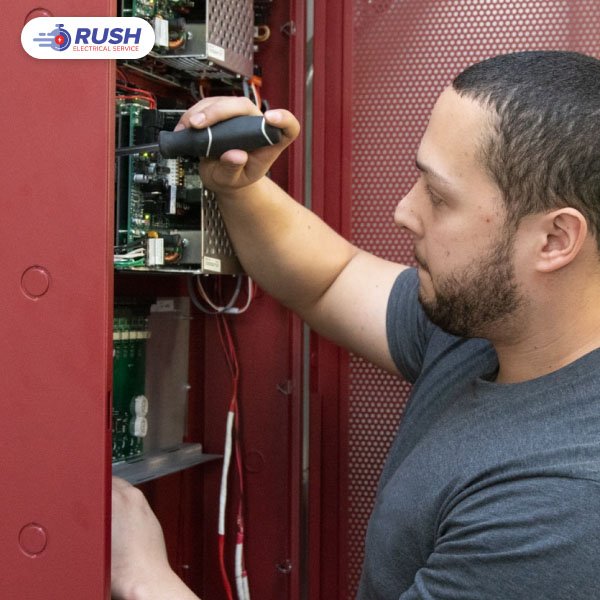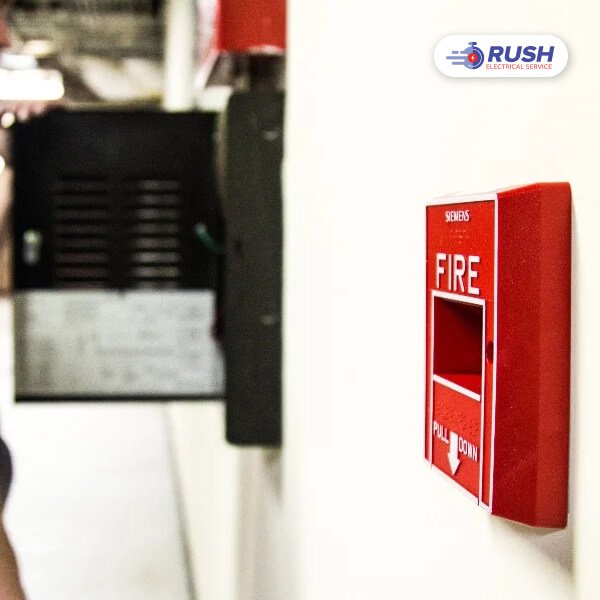2 Types of Fire Alarms: Which is Better For You?

A fire can be dangerous, and without a fire alarm, it’s hard to detect it unless it has grown bigger and more hazardous. Therefore, most homes and businesses avail of fire alarm services that ensure they are warned when there is a fire. But, there are two fire alarm systems, and we’ll discuss them here. This way, you’ll know which type works best for your home. Rush Electrical Service gathered information about the two types of fire alarms, how they work, and their unique features. Let’s learn more about them now.
- Conventional Fire Alarm Systems
A conventional fire alarm system is simple, with all the smoke detectors connected to the control panel. When a fire is detected, the system lets out a signal from the control panel, telling the person that a small fire is present. A problem with this type of alarm system is that it cannot tell the owner exactly where the smoke is when it detects smoke or fire. Therefore, conventional fire alarm systems are advisable for small residential homes.
- Addressable Fire Alarm Systems
An addressable fire alarm system is the newest available today. The system allows the owner to identify where the fire alarm went off and indicate the exact location of the fire. This way, the person won’t have to go to each room to find where the alarm went. Addressable fire alarm systems are perfect for bigger homes or establishments requiring multiple fire alarms.
If you have a bigger home or own a business, an addressable fire alarm system is the one you should get. This way, you can control each fire alarm easier. But, if you have a humble home that does not require multiple smoke detectors, then a conventional fire alarm should do the job.
Fire Alarms: How Are They Wired?

When you wire your fire alarms, you’ll need a 2-conductor cable that connects your fire detector to your breaker panel. You’ll also need a 3-conductor cable that connects to your detector, another for the onward, and the third for tripping when the detector goes off due to fire.
If you don’t have a background in electrical wirings but want to install a fire alarm system, then avail of a fire alarm system installation for proper installation and results. It’s always better to hire a professional, especially if you don’t have any experience.
Are Fire Alarms and Smoke Detectors Similar?
Some might think a fire alarm and a smoke detector are the same. A smoke detector is part of the entire fire alarm system. It detects smoke and sends a signal to the fire alarm to turn it on. Then, the fire alarm will sound and signal to the control panel for the owner to see.
Most people call the entire fire alarm system a smoke detector. So, to avoid confusion, the entire system is the fire alarm, while the small devices installed on your ceilings are the smoke detectors.
Hardwired or Battery Smoke Detectors? Which One Best Fit Your Style?
Hardwired smoke detectors are wired to a 120-volt circuit and have batteries to ensure they function even during a power outage. In contrast, battery smoke detectors are only powered by a set of batteries that needs to be changed once in a while. So, which is better for your home?
The best option for any home is a hardwired smoke detector to ensure that your smoke detector will alarm no matter the situation. Also, most fires can start when there is no power, and you use candles to light your home. So, having a hardwired smoke detector with batteries is a great way to stay safe.
What You Should Do When Your Fire Alarm Goes Off For No Reason
The sound of a fire alarm is quite irritating, so when yours goes off for no reason, it can be annoying. Plus, most alarm systems are connected to fire departments, and faulty systems could mislead the fire department. When you have a faulty fire alarm, here is what you should do:
- Press the power button to eliminate the noise.
The first thing you can do is to turn off your alarm’s power. You can press the power button for ten seconds and let go. This step will also reset your smoke detector and stop the noise from returning when there’s no fire.
- Press the silencer button.
You’ll find most smoke detectors have silencer buttons you can press to stop the noise. Before turning off the sound, investigate your surroundings and ensure there is no fire. If there is, then evacuate your home at once.
- Wait for the noise to quiet down.
Most smoke detector units have a “hush time, ” which stops alarming if no fire is detected. The noise will die in about 5 minutes, ensuring no smoke or fire is present. If this does not happen, it’s time to have your fire alarm system checked for malfunctions.
Maintenance For Fire Alarm Systems: What You Need
Fire alarm systems might be one of the most neglected systems at home, for they are not noticeable and will form damage if not regularly maintained. To ensure optimal performance and for your safety, learn how you can maintain your fire alarm system:
- It would help if you had a maintenance checkup at least once yearly. This maintenance ensures all parts of your fire alarm system work properly. This way, you won’t have to worry about your safety constantly.
- Replace damaged fire alarm systems for at least after eight years. If you have done multiple repairs in the past eight years, then it’s time for an upgrade and reinstallation. Don’t worry; you have many years to save money on a new fire alarm system.
- You should replace emergency power supplies like batteries every four years if you have an addressable fire alarm system. But, if you have a conventional one, you must replace batteries more often.
Now that you know what to do with your fire alarm system issues, you are ready for any situation. Always hire a professional to assist you with electrical wiring needed for a fire alarm system installation, repair, or upgrade.
Gain more information about fire alarm systems or any electrical-related topics that will help you maintain your home when you read more of our blogs. This way, your home will be safer, and you’ll have added knowledge about your electrical systems.
Testimonials




